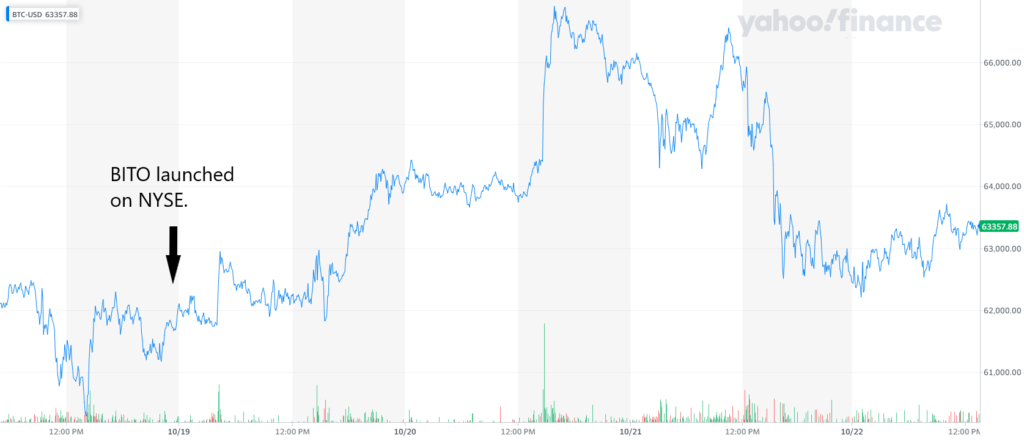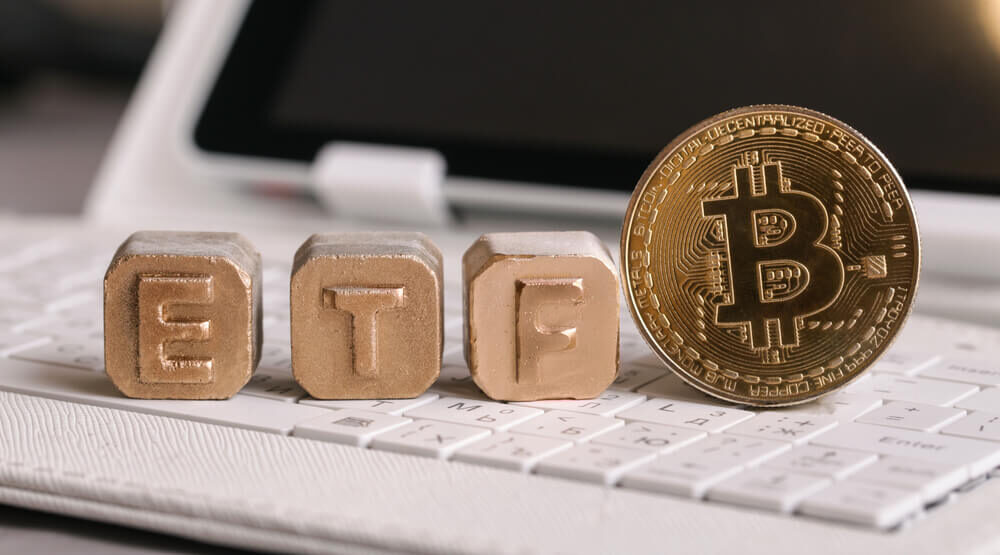This has been the year of crypto.
I know these digital currencies have been around for a while now, but one factor kept Bitcoin, Ethereum and other cryptos on the fringe for a long time: accessibility. They were not easy to buy or manage.
But that’s not the case anymore. Multiple brokerages now offer ways to invest in a wide variety of cryptocurrencies, and more businesses are accepting it as payment seemingly every day.
And we’ve reached the next crypto milestone. On Tuesday, the ProShares Bitcoin Strategy ETF (NYSE: BITO) began trading on the public market.
Exchange-traded funds (ETFs) are a useful investing tool. If you want broad exposure to a certain sector or investing theme like “high-growth” or “biotech,” there’s a fund for that.
Before you jump headfirst into this new bitcoin ETF, there’s an important thing to consider. And some of this week’s headlines highlight this fact:
- “The New ProShares Bitcoin ETF Has a Unique Set of Risks.”
- “JPMorgan Warns Boom for Bitcoin Futures ETFs May Come at a Cost.”
- “Is the ProShares Bitcoin ETF too popular?”
The Pros and Cons of the BITO Bitcoin ETF
BITO is a bitcoin futures ETF. That means it is not anchored to the current “spot” price of the cryptocurrency. This fund is comparable to a commodities futures fund. It deals with futures contracts, which can be expensive to manage.
These contracts provide exposure to bitcoin’s price moves, but they have monthly expiration dates. And rolling soon-to-expire contracts to a future month comes with a cost that is passed on to the ETF’s investors. BITO’s expense ratio is 0.95, so each year, you pay $9.50 for every $1,000 managed within the fund.
BITO is convenient, though. This bitcoin ETF gives you exposure to the asset’s price moves without having to worry about digital wallets or accessing your supply of BTC.
Should You Invest in BITO?
The BITO bitcoin ETF is a huge step forward for cryptocurrencies. It offers another way for investors to gain exposure to an asset. And that will bring more traders into bitcoin, solidifying its position as a crypto leader.
Need proof? Just look at what happened to bitcoin’s price after BITO started public trading on Tuesday:
BITO Triggered Bitcoin Rally

Source: Yahoo Finance.
Bitcoin rose almost 4% by 4 p.m. Eastern time on Tuesday, and then it rose above $66,000 for the first time ever on Wednesday. Analysts attribute a lot of this move to the successful launch of BITO.
But should you invest in BITO?
This bitcoin ETF offers a convenient way to invest in bitcoin without having to worry about storing the asset in a digital wallet or other means. The fund already has more than $1 billion assets under management, so I think it’s solidified itself in the market in a short amount of time.
It comes down to whether you’re comfortable with futures. I would take time to learn about futures if you aren’t familiar. You don’t want to get burned by unexpected fees that cut into your gains.
How to Invest in Crypto Outside of a Bitcoin ETF
We cover a large swath of investing ideas here on Money & Markets, but I don’t think anyone on the team would call themselves a crypto expert.
Sure, we know the basics, and we’re always learning more. We see the potential.
But sometimes it’s best to bring in an expert like Banyan Hill Publishing’s Ian King.
Chief investment strategist Adam O’Dell sat down with Ian for his latest episode Ask Adam Anything. If you want to know about Ethereum versus Bitcoin, the future of decentralized finance and how to trade non-fungible tokens (NFTs), check out their interview here.
Ian has been recommending cryptos for years now, and it’s given his reader the chance to make massive gains.
He recommended a top crypto trade that gained 3,900% in three months (on half a position) and another for 1,900% in four months (also on half a position).
And he wants to be your guide into what he calls “Crypto’s Third Wave.” Click here to watch his presentation now.
Best investing,

Chad Stone
Assistant Managing Editor, Money & Markets




